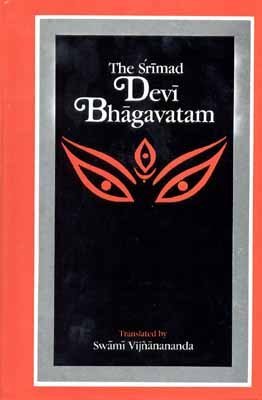The Devi Bhagavata Purana
by Swami Vijñanananda | 1921 | 545,801 words | ISBN-10: 8121505917 | ISBN-13: 9788121505918
The English translation of the Devi Bhagavata Purana. This Sanskrit work describes the Devi (Divine), the Goddess, as the foundation of the world and as identical with Brahman, the Supreme Being. The Devi Bhagavata Purana is one of the most important works in Shaktism, a branch of Hinduism focusing on the veneration of the divine feminine, along w...
Chapter 13 - On the description of Janamejaya’s Devī Yajñā
1-4. Vyāsa said :-- O King Janamejaya! Thus I have answered all your nice queries; also what Nārāyaṇa spoke to the highsouled Nārada is also said by me. He who hears this greatly wonderful Purāṇam Śrī Devī Bhāgavatam certainly becomes dear to the Devī and all his actions become fructified with success. Now as regards your mental distress, how you prevent any evil falling to your late father in his future life, I advise you to do the Yajñā in the name of Bhagavatī; and certainly your father will be saved. And you also better take the Most Excellent Mantra of the Mahā Devī duly, according to rules; and your human life will then be crowned with success; (your life will be saved; thus you as well as your father will be saved).
5-12. Sūta said :-- O Ṛṣis! Hearing thus, the King asked Vyāsa Deva to initiate in the Great Devī Mantra and thus to become his Guru. He was then initiated duly according to rules with the Great Mantra of Bhagavatī united with Praṇava. When the Navarātra period arrived, he called Dhaumya and other Brāhmaṇas and performed the Navarātra Vrata so very dear to the Devī, according to his state. At this time for the satisfaction of the Devī, he caused this Devī Bhāgavata Purāṇa to be read by the Brāhmaṇas and fed innumerable Brāhmaṇas and Kumārīs (virgins) and gave in charity lots of things to the poor, orphans, and the Brāhmin boys and thus finished the Vrata. O Ṛṣis! Thus completing the Devīyajñā, while the King was sitting on his seat, the fiery Devarṣi Nārada came there from above playing with his lute. Seeing him there, all on a sudden, the King got up, and paid due respects to him by asking him to take his seat, with other necessary things. When the Devarṣi became relieved of his labour of journey, the King asked him about his welfare and then enquired into the cause of his coming there.
13-19. O Devarṣi! Whence and what for are you now coming? By your arrival here I am become blessed and feel that my Lord has come to me; now what can I serve to you; kindly command and oblige.
Hearing this, the Devarṣi Nārada said :-- “O King! Today I saw in the Devaloka a very wonderful event. I wanted eagerly to inform that to you. Hence I have come here. Your father met with a bad turn of fate for his bad action. I saw today he assumed a divine form and he was going on a chariot. The Devas were praising him and the Apsarās were encircling him. It seemed he was going in that dress to the Maṇi Dvīpa. O King! You performed the Navarātra Vrata and read the Devī Bhāgavata; it seems, as a result of that, your father has now been rewarded with such a noble and good turn of fate. Now you have become blessed and your actions have borne fruits. You have delivered your father from the hell and so you have become an ornament in your family. Today your name and fame have extended to the Devaloka.”
20-30. Sūta said :-- O Ṛṣis! Hearing these words from the mouth of Nārada, the King Janamejaya became very much happy and delighted and fell prostrate at the feet of Vyāsa Deva of glorious deeds and said :-- O Best of Munis! By Thy Grace, today I have become blessed. Now what return can I pay to Thee save bowing down to Thee. I pray that Thou dost shew such favours to me ever and again.
O Ṛṣis! Hearing these words of the King Janamejaya, Vādarāyaṇa Veda Vyāsa blessed him and spoke to him in sweet words :-- “O King! Now leave all other actions. Read always the Devī Bhāgavata and worship the Lotus Feet of Śrī Devī. Leave off all laziness and now perform the Devī Yajñā with great eclāt. And you will surely be able to cross this bondage of the world. True there are various Purāṇas, the Viṣṇu Purāṇa, the Śiva Purāṇa, but those cannot compare with one sixteenth of this Devī Bhāgavatam. In fact, this Purāṇa is the Essence of all the Purāṇas. How can the other Purāṇas be compared with this, wherein is established the Devī Mūla Prakriti? Reading this Purāṇa from the beginning to the end yields the result of reading the Vedas. So the wise persons should try their best to study it always.” Thus saying to Janamejaya, Veda Vyāsa departed. Then the pure minded Dhaumya and the other Brāhmaṇas highly praised the Devī Bhāgavatam and went to their desired places. And the King Janamejaya, on the other hand, began to read and hear always the Devī Bhāgavatam and spent his days happily in governing his kingdom.
Here end the Thirteenth Chapter of the Twelfth Book on the description of Janamejaya’s Devī Yajñā in the Mahā Purāṇam Śrī Mad Devī Bhāgavatam of 18000 verses by Maharṣi Veda Vyāsa.
